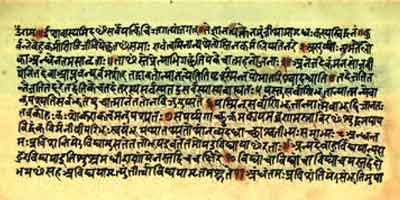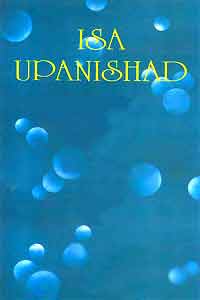 Isa Upanishad derives its title from the opening words Isavasya, meaning God covered. The use of Isa (Lord) is a more personal name of the Supreme Being. It forms the closing chapter of the Yajur Veda and is known as Shukla (White). Oneness of the Soul and God and the ultimate attainment of it are the leading themes of Isa Upanishad. Isa Upanishad has eighteen mantras.
Isa Upanishad derives its title from the opening words Isavasya, meaning God covered. The use of Isa (Lord) is a more personal name of the Supreme Being. It forms the closing chapter of the Yajur Veda and is known as Shukla (White). Oneness of the Soul and God and the ultimate attainment of it are the leading themes of Isa Upanishad. Isa Upanishad has eighteen mantras.
The first mantra says,
Isavasyamidam sarvam yatkinca jagatyam jagat |
tena tyaktena bhu¤jitha ma grdhah kasyasvid dhanam.
The mantra means that; all this, whatsoever moves on earth, is to be hidden in the Lord (the Self). One must secure himself by renunciation. One must not desire for other`s wealth.
The second mantra says, kurvanneveha karmani jijivisecchatam samah |
evam tvayi nanyatheto`sti na karma lipyate nare.
The mantra conveys that if a man wishes to live a hundred years he should do so by performing his work, it will be thus with him; but not in any other way: work will thus not cling to a man.
The third mantra is written as, asurya nama te loka andhena tamasa`vrtah |
tamste pretyabhigacchanti ye ke catmahano janah
According to the third mantra there are the worlds of the Asuras covered with blind darkness. Those worlds of the asuras are enveloped in blind darkness; and thereto they all repair after death who are the slayers of Atman.
The fourth mantra says, anejadekam manaso javiyo nainaddeva apnuvanpurvamarsat |
taddhavato`nyanatyeti tisthattasminnapo matarisva dadhati.
The mantra explains that one (the Self), though never stirring, is swifter than thought. Though standing still, it overtakes the others who are running. MÆ’tarisvan (the wind, the moving spirit) bestows powers on it.
The fifth mantra narrates tadejati tannaijati taddure tadvantike |
tadantarasya sarvasya tadu sarvasya bahyatah
According to this mantra It stirs and it stirs not; it is far, and likewise near. It is inside of all this, and it is outside of all this.
The sixth mantra says, yastu sarvani bhutanyatmanyevanupasyati |
sarvabhutesu catmanam tato na vijugupsate.
This mantra says he who beholds all beings in the Self, and the Self in all beings, he never turns away from it.
The seventh mantra states, yasminsarvani bhutanyatmaivabhudvijanatah |
tatra ko mohah kah soka ekatvamanupasyatah
The seventh mantra explains that when to a man who understands, the Self has become all things, what sorrow, what trouble can there be to him who once beheld that unity?
 The eighth mantra of Isa Upanishad saya, sa paryagacchukramakayamavranamasnaviram
suddhamapapaviddham
The eighth mantra of Isa Upanishad saya, sa paryagacchukramakayamavranamasnaviram
suddhamapapaviddham
kavirmanisi paribhuh svayambhuryathatathyato`rthan
vyadadhacchasvatibhyah samabhyah
The mantra states that He (the Self) encircles all, bright, incorporeal, without muscles, pure, untouched by evil; a seer, wise, omnipresent, self-existent, he has duly allotted to the eternal World their respective duties.
The ninth mantra is andham tamah pravisanti ye`vidyamupasate |
tato bhuya iva te tamo ya u vidyayam ratah
This explains that all who worship what is not real knowledge (good works), enter into blind darkness where as those who delight in real knowledge enters into greater darkness.
The tenth mantra is, anyadevahurvidyaya`nyadahuravidyaya |
iti susruma dhiranam ye nastadvicacaksire ||
It states that one thing, as they say, is obtained from real knowledge; another, as they say, from that is not knowledge. Thus we have heard from the wise who taught us this
The eleventh mantra states, vidyam cavidyam ca yastadvedobhayam saha |
avidyaya mrtyum tirtva vidyaya`mrtamasnute ||
This explains that he who is aware that both knowledge and ignorence, overcomes death and obtains immortality through knowledge.
The twelfth mantra of Isa Upanishad says, andham tamah pravisanti ye`sambhutimupasate
tato bhuya iva te tamo ya u sambhutyam ratah ||
This mantra states all who worship what is not the true cause, enter into blind darkness where as those who delight in the true cause, enter, as it were, into greater darkness.
The thirteenth mantra says, anyadevahuh sambhavadanyadahurasambhavat |
iti susruma dhiranam ye nastadvicacaksire.
This means one thing is obtained from (knowledge of) the cause; while another from (knowledge of) what is not the cause. Thus we have heard from the wise who taught us this.
The fourteenth mantra states sambhutim ca vinasam ca yastadvedobhayam saha |
vinasena mrtyum tirtva sambhutya`mrtamasnute
The mantra states he who knows at the same time both the cause and the destruction (the perishable body), overcomes death by destruction (the perishable body), and obtains immortality through (knowledge of) the true cause.
The fifteenth mantra says, hiranmayena patrena satyasyapihitam mukham |
tat tvam pusannapavrnu satyadharmaya drstaye.
The mantra conveys the message that the door of the True is covered with a golden disk Open that, O P–shan, that we may see the nature of the True.
The sixteenth mantra of Isa Upanishad says, pusannekarse yama surya prajapatya vyuha rasmin |
samuha tejah yat te rupam kalyanatamam tat te pasyami.
This means that O Pushan, only seer, Yama the judge, Surya the sun, son of Pragapati, spread your rays and gathers them! The light which is ypur fairest form, I see it. I am what He is
The seventeenth mantra says, vayur anilam amrtam athedam bhasmantam sariram
om krato smara krtam smara krato smara krtam smara
The message conveyed through this is Now may my breath return to the all-pervading, immortal Prana! May this body be burnt to ashes! Om. O mind, remember; remember all that I have done.
The final mantra says, agne naya supatha raye asman visvani deva vayunani vidvan
yuyodhy asmaj juhuranam eno bhuyistham te nama uktim vidhema.
This mantra says that Agni, lead us on to wealth (beatitude) by a good path, thou, O God, who knowest all things! Keep far from us crooked evil, and we shall offer thee the fullest praise!



















